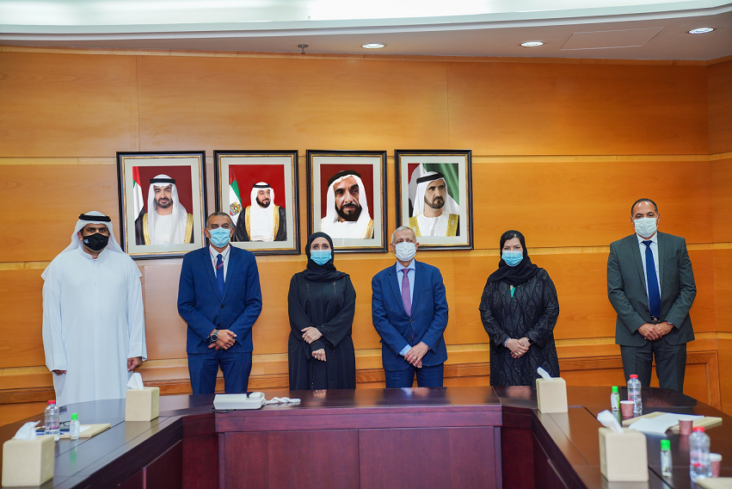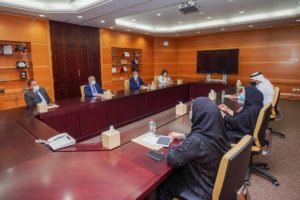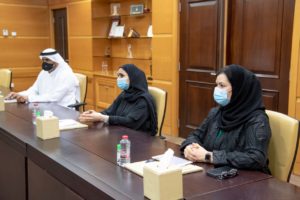The Arab Academy For Science, Technology And Maritime Transport In Sharjah Initiates A Collaboration With The Federal Transport Authority – Land & Maritime

The Arab Academy for Science, Technology and Maritime Transport in Sharjah (AASTS)has successfully commenced talks for a collaboration with The Federal Transport Authority – Land & Maritime (FTA). This will include utilising AASTS’ capabilities and the expertise of its staff to develop the UAE’s maritime sector. The move supports AASTS’ vision to strengthen the Arab maritime sector by training national cadres and providing research and development services. It also supports AASTS’ strategy to strengthen the UAE’s position as a leading maritime hub globally.
The meeting was attended by H.E.Dr. Ismail Abdel Ghaffar Ismail Farag, President of the Arab Academy for Science, Technology and Maritime Transport (AASTMT)andH.E. Eng. Hessa Al Malek, Executive Director of Maritime Transport at FTA.Dr. Ahmed Youssef, Associate Dean of Maritime Transport and Technology College, AASTS; Dr.AyshaAl Busmait, IMO Goodwill Ambassador and Corporate Communications Director at FTA; and Captain Abdullah AlHayas, Director of MaritimeAffairs Department, FTA, were also present.
The two sides discussed cooperation in various areas including education and training; conducting specialised research to develop the shipping, ports and logistics services; and developing training in maritime electronic capabilities and cybersecurity for shipping and maritime operations and ports. They also discussed cooperation in key areas such as promoting the use of Artificial Intelligence (AI) to deal withoil pollution, the sustainability of ports, blue economy and maritime financing, in addition to providing technical support.
H.E. Eng. Ahmed Sharif Al Khouri, Director General of FTA, said: “In the UAE, we are determined to be ‘number one’ in all areas. The country is a role model for sustainable development. Our leaders continually ensure the prosperity and wellbeing of the current and future generations in the post-oil era. This is the essence of the UAE’s strategy as it prepares for the next fifty years. The maritime economy and the maritime sector are key pillars to achieve this vision.”
Al Khouri added: “This goal cannot be achieved without qualified and creative people who can utilise these opportunities and build on the achievements of our founding father sunder the flag of the Union. Our leaders transformed challenges into successes and unparalleled prosperity, and we must continue to do so. To promote such growth, we are discussing opportunities with AASTS, a prestigious academic institution in the region, which is on a mission to enhance the Arab region. As a part of the League of Arab States, itis a benchmark in the education and training sector. It plays an important role in providing the Arab World with competencies and experts in scientific research, consultancy and academic studies.”
Developing economic capabilities
H.E. Dr.Ismail Abdel Ghaffar Ismail Farag, President of AASTMT, said: “As an organisation associated with the League of Arab States, we are mandated to explore cooperation prospects to develop the economic capabilities of all Arab countries. However, our relationship with the UAE is a special one. Since the establishment of our Sharjah branch, we have received unlimited support from the leadership and decision-makers to empower the maritime sector. The generous scholarships and top-notch facilities the leadership has allocated to the Academy in Sharjah make it on a par with the best maritime academies internationally. Today, we can proudly say that this branch is the largest of all, and is comparable in size and capabilities to our headquarters in Alexandria.”
He added: “Taking into account that the UAE is a leading global maritime hub, exploring cooperation and development opportunities with FTA is an important step. The country has retained its membership in the International Maritime Organisation for the second time in a row. To be able to maintain this esteemed position, it is important for us to support in multifarious ways. We hope to contribute by improving and developing the best maritime practices and providing advisory and scientific studies for specialised applications and cases, thereby impacting the global maritime industry.”
Cooperation in maritime cybersecurity
AASTS and FTA also discussed key factors like providing support in digital capabilities in shipping, maritime and port operations, and electronic maritime management and maritime cybersecurity.
H.E. Eng. Hessa Al Malek, Executive Director of Maritime Transport at FTA, said: “The UAE has made significant progress in digitalising its maritime infrastructure. Our ports are the most automated worldwide, and our shipping companies own exceptional state-of-the-art digital platforms. The UAE’s digital capabilities are comparable to distinguished programming and electronic solution companies and can outperform them in practical application. The demand for technology-enabled solutions is soaring as the maritime sector is becoming increasingly dependent on digital technologies. Hence, it is vital to deploy young cybersecurity experts. This will enhance the protection of our digital maritime assets and make the UAE a global provider of this essential service.”
Developing maritime training
Commenting on how the much-awaited collaboration will impact maritime training and qualification, Dr. Ahmed Youssef, Associate Dean of Maritime Transport and Technology College, AASTS, said: “Maritime education depends significantly on the practical aspects. This is the biggest challenge maritime academies around the world face, considering the high costs of training vessels. We look forward to FTA’s support to facilitate the training of our students on ships operating in the UAE. This will give the Academy a competitive edge, and make our national graduates better qualified as they will be equipped with practical experience of working on ships of various types and sizes.”
AASTS has the highest percentage of female students among maritime academies in the Middle East and North Africa. Enrolled female students constitute more than 43 per cent of the total number of students. This supports the UAE’s strategy and is in line with the FTA’s priority to empower women in the maritime sector, and employ their capabilities and creativity to boost the maritime sector.



